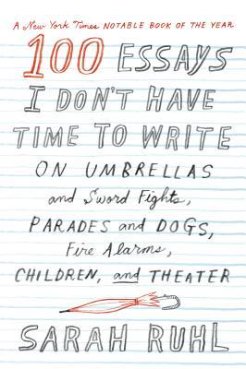I remember Alice Walker's essay in my twenties about how a woman writer could manage to have on child, but more was difficult. At the time, I pledged to have no more than one, or at the very most two. (I now have three.) I also remember, before having children, reading Tillie Olsen, who described with such clarity: thinking and ironing and thinking and ironing and thinking and ironing and writing while ironing and having many children—she herself had four. I myself do not iron. My clothes and the clothes of my children are rumpled. The child's need, so pressing, so consuming, for the mother to be there, to be present, and the pressing need to the writer to be half-there, to be there but thinking of other things, caught me—
Sorry. In the act of writing that sentence, my son, William, who is now two, came running into my office crying and asking for a fake knife to cut his fake fruit. So there is also, in observing children much of the day and making theater much of the night, this preoccupation with the real and the illusory, and the pleasures and pains of both.
In any case, please forgive the shortness of these essays; do imagine the silences that came between—the bodily fluids, the tears, the various shades of—
In the middle of that sentence my son came in and sat at my elbow and said tenderly, "Mom, can I poop here?" I think of Virginia Woolf's A Room of One's Own and how it needs a practical addendum about locks and bolt and soundproofing.
But I digress. I could lie to you and say that intended to write something totalizing, something grand. But I confess that I had a more humble ambition—to preserve for myself, in rare private moments, some liberty of thought. Perhaps that is equally 7.
My son just typed 7 on my computer.
There was a time, when I first found out I was pregnant with twins, that I saw only a state of conflict. When I looked at theater and parenthood, I saw only war, competing loyalties, and I thought my writing life was over. There were times when it felt as though my children were annihilating me (truly you have not lived until you have changed one baby's diaper while another baby quietly vomits on your shin), and finally I came to the thought, All right, then, annihilate me; that other self was a fiction anyhow. And then I could breathe. I could investigate the pauses.
I found that life intruding on writing was, in fact, life. And that, tempting as it may be for a writer who is also a parent, one must not think of life as an intrusion. At the end of the day, writing has very little to do with writing, and much to do with life. And life, by definition, is not an intrusion.
